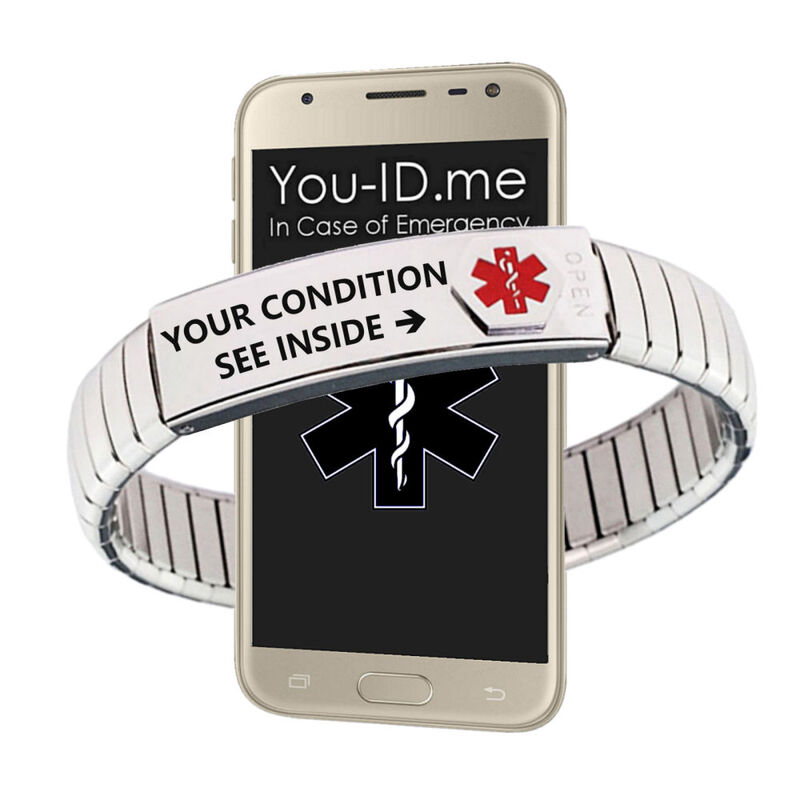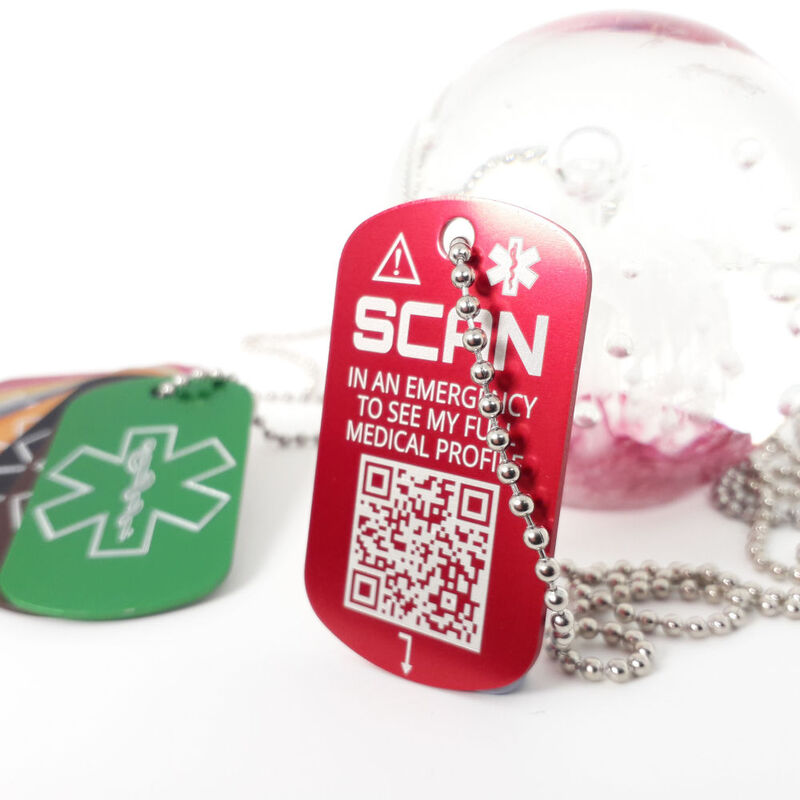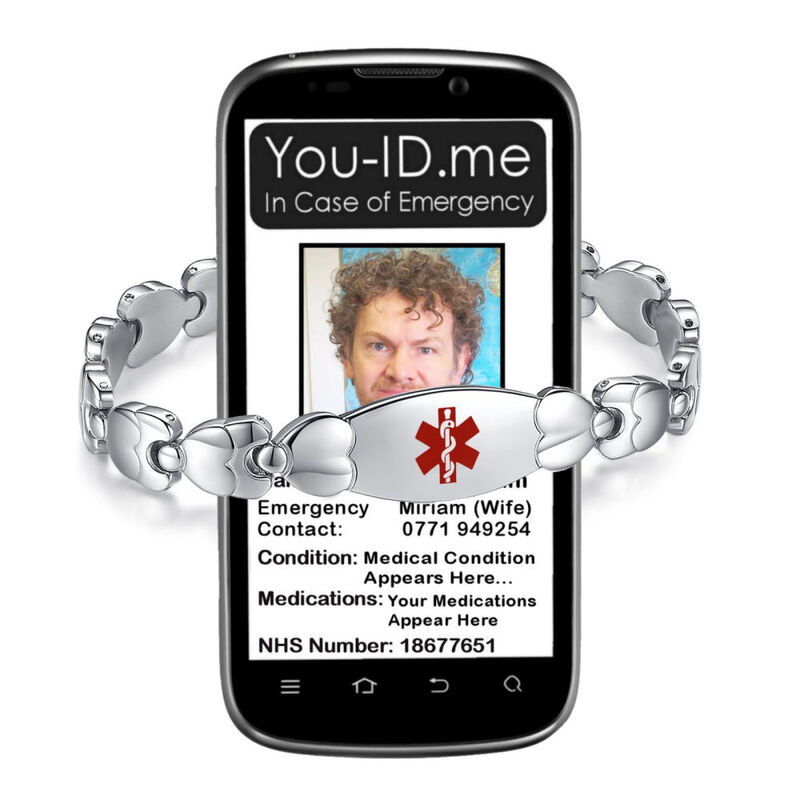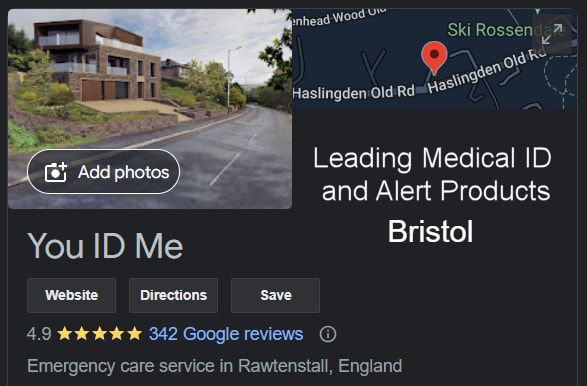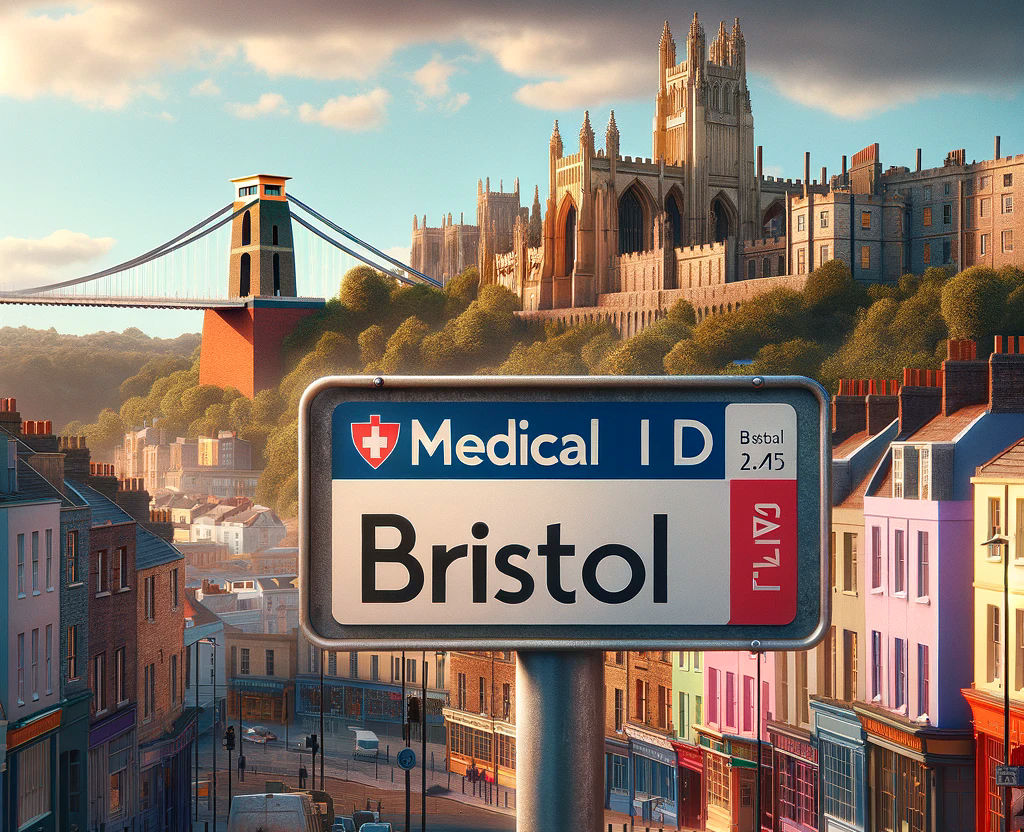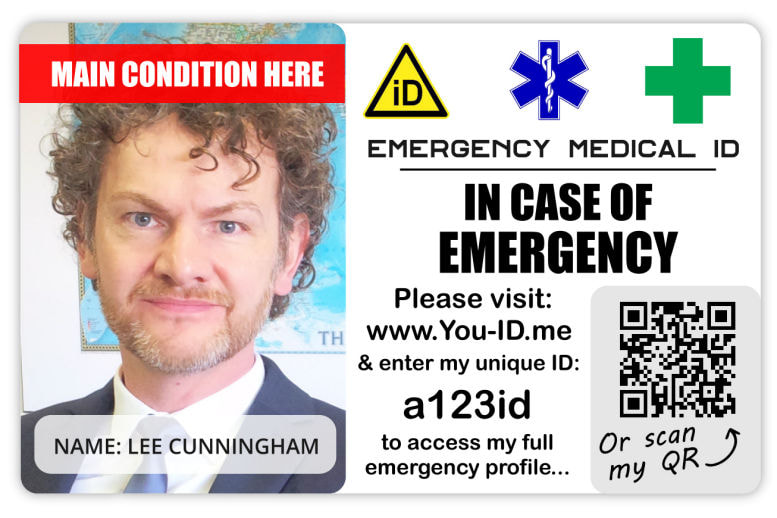|
Medical ID in Bristol CityAre you looking for medical ID bracelets, necklaces (jewellery) or medical cards or badges in Bristol?
Stop for just a moment. Before you buy a medical alert bracelet, necklace, tag, card or badge, have you heard of the You ID Me service? Watch this 60 second video.... You ID Me is the UK's leading emergency ID and alert service, providing paramedics and first responders with instant access to your vital ID, critical medical info and your emergency contacts' details, to the screen of their device directly from your medical ID product.
You ID Me can also alert your emergency contacts phone to let them know you have a problem. Plus it can share with them the contact details of the paramedic treating you whether that's in Bristol or elsewhere. With You ID Me there's no more waiting for a knock at the door for your family members. All You ID Me medical alert products have you and your family covered... ...and the best thing is, it's available to you in Bristol. Popular in Bristol: Medical ID - Mens & Ladies Bracelets, Necklaces & CardsYou can now buy medical ID bracelets, necklaces, tags or cards in Bristol that have You ID Me built into them, so that if you have a medical emergency, the first responder that helps you will can quickly and easily get all your vital information - straight to the screen of their mobile device.
That means they can start giving you better emergency care sooner. |
VideosWatch a You ID Me Explainer Video...
Watch a 60 Second Demonstration of You ID Me in Action...
Listen to Speak4me Talking to Paramedics...
|
How Medical ID Products Work with You ID Me
|
All our medical ID products are either engraved or printed with a unique ID.
Users activate their unique ID by registering the information they 'd like to be shared in case of emergency. Registration is quick and easy. You ID Me has two service plans. Gold and Platinum: -
When you wear or carry a medical alert product from You ID Me in Bristol three key things can happen in an emergency: -
* Platinum plan subscribers only |
Local delivery right across the UKBest Selling |
Medical ID Direct to Bristol and Local Areas...
We supply and deliver medical ID products for ANY medical condition to men, women, and children in and around 'Bristol'. Here's a list including the first few characters of our delivery postcodes:
- Bath, BA1
- Keynsham, BS31
- Nailsea, BS48
- Portishead, BS20
- Clevedon, BS21
- Weston-super-Mare, BS23
- Yate, BS37
- Thornbury, BS35
- Chippenham, SN14
- Caldicot, NP26
- Chepstow, NP16
- Filton, BS34
- Bradley Stoke, BS32
- Trowbridge, BA14
- Frome, BA11
Bristol Health Index and Medical Information
The Health Index acts as an integrated metric for assessing health, offering a singular score that tracks fluctuations in health status across time. It delves into various health-related facets, shedding light on the underpinning factors of these changes.
Tailored to measure health at local, regional, and national levels, the Index is instrumental for comparing health outcomes across different geographical zones and timeframes. Currently, its scope is limited to England, with aspirations to broaden coverage to encompass the entire UK. This index is not just a measure but a strategic tool for pinpointing health disparities and guiding public health interventions.
In Bristol, the Health Index unveils a nuanced picture of health dynamics within the city. Registering a score of 91.4 in 2021, Bristol saw a modest increase of 0.5 points from the preceding year, placing it in the lower echelon of English local authorities concerning health outcomes. Positioned in the bottom 20 percent, the city's health landscape reflects both challenges and areas of relative strength.
Highlighting its strengths, Bristol excels in the "access to services" subdomain, attaining its highest score at 106.5. This dimension evaluates the accessibility and proximity to critical health services, acknowledging the constraints posed by the pandemic on face-to-face service delivery. However, "mental health" emerges as the city's most pressing challenge, underscoring the need for enhanced mental health support and resources.
The analysis of "behavioural risk factors" reveals a slight decline over six years, influenced significantly by increases in sexually transmitted infections and sedentary behaviours. Conversely, "economic and working conditions" in Bristol have seen considerable improvement, reflective of the city's strides in job-related training and unemployment reduction.
Notably, the "living conditions" subdomain indicates an area of concern when compared nationally, despite incremental progress. The evaluation encompasses factors such as air pollution, overcrowding, and rough sleeping, with Bristol showing varied performance across these indicators.
The city's health profile is marked by extremities in certain health indicators, with sexually transmitted infections posing a significant challenge, juxtaposed against strengths in areas like teenage pregnancy and physical activity. Bristol's diverse health indicators highlight both accomplishments and areas ripe for targeted interventions to ameliorate health disparities.
Tailored to measure health at local, regional, and national levels, the Index is instrumental for comparing health outcomes across different geographical zones and timeframes. Currently, its scope is limited to England, with aspirations to broaden coverage to encompass the entire UK. This index is not just a measure but a strategic tool for pinpointing health disparities and guiding public health interventions.
In Bristol, the Health Index unveils a nuanced picture of health dynamics within the city. Registering a score of 91.4 in 2021, Bristol saw a modest increase of 0.5 points from the preceding year, placing it in the lower echelon of English local authorities concerning health outcomes. Positioned in the bottom 20 percent, the city's health landscape reflects both challenges and areas of relative strength.
Highlighting its strengths, Bristol excels in the "access to services" subdomain, attaining its highest score at 106.5. This dimension evaluates the accessibility and proximity to critical health services, acknowledging the constraints posed by the pandemic on face-to-face service delivery. However, "mental health" emerges as the city's most pressing challenge, underscoring the need for enhanced mental health support and resources.
The analysis of "behavioural risk factors" reveals a slight decline over six years, influenced significantly by increases in sexually transmitted infections and sedentary behaviours. Conversely, "economic and working conditions" in Bristol have seen considerable improvement, reflective of the city's strides in job-related training and unemployment reduction.
Notably, the "living conditions" subdomain indicates an area of concern when compared nationally, despite incremental progress. The evaluation encompasses factors such as air pollution, overcrowding, and rough sleeping, with Bristol showing varied performance across these indicators.
The city's health profile is marked by extremities in certain health indicators, with sexually transmitted infections posing a significant challenge, juxtaposed against strengths in areas like teenage pregnancy and physical activity. Bristol's diverse health indicators highlight both accomplishments and areas ripe for targeted interventions to ameliorate health disparities.


